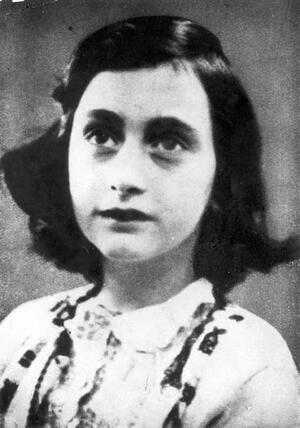Dramatization of Anne Frank's diary broadcast on the radio
Perhaps the most famous child and most famous memoirist to have been a victim of World War II, the young Anne Frank (1929 – 1945) did not survive the Holocaust—but her diary did. With more than fifty language translations and more than thirty million copies sold, The Diary of Anne Frank today remains at the center of discussions of antisemitism, Holocaust memory, national guilt and responsibility, Jewish identity, acculturation, literature, drama, child psychology, and even historical revisionism, but above all, as the symbol of a young girl's belief in humankind's innate goodness and her hope for a better future.
Institution: Yad Vashem, Jerusalem.
Soon after the 1952 publication of the English translation of Anne Frank's war-time diary of her family's hidden life in Nazi-controlled New Amsterdam, her story found its way to the American airwaves. A televised dramatization of the diary, written by Morton Wishengrad, appeared on NBC television's Frontiers of Faith in November. Jewish journalist Meyer Levin who had visited the concentration camps after the war had contacted Anne's father Otto Frank to request the rights to create a play based on the diary. On December 14, a radio drama written by Levin, called "Anne Frank: Diary of a Young Girl," appeared on The Eternal Light series, produced by the Jewish Theological Seminary on the NBC network. In 1955, a stage version written by Frances Goodrich and Albert Hackett appeared on Broadway.
Anne's account, depicting the spirit with which she continued to hope for the future and for humankind despite her family's desperate situation, struck a chord with American audiences, particularly with young girls and teenagers. Her diary and its various dramatizations exposed many people for the first time to the personal side of the destruction of European Jewry.
The Broadway play won a Tony Award in 1955 and was later portrayed in film in 1959. A 1995 restaging of the Broadway play included previously deleted sections of the diary, including political and religious references. Since its first release, the Diary of Anne Frank has sold more than 30 million copies and has been published in more than 60 languages. For over 50 years, the story of Anne Frank, who died in 1945 in the Bergen-Belsen concentration camp at age 15, has provided many people with a sense of personal connection to an often ungraspable tragedy.
Sources: Lawrence Graver, An Obsession with Anne Frank: Meyer Levin and the Diary (Berkeley, CA, 1995); J. Hoberman and Jeffrey Shandler, eds., Entertaining America: Jews, Movies, and Broadcasting (Princeton, NJ, 2003), pp. 192-193; www.annefrank.com.



